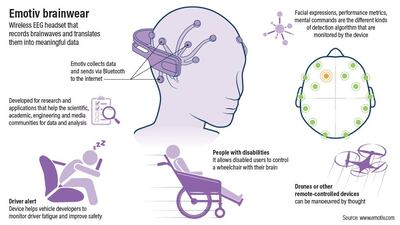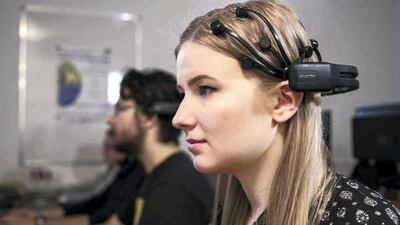Fatal errors of judgment and lapses of concentration at the wheel could become a thing of the past with the introduction of brain-scanning headsets that keep drivers alert and warn of hazards ahead.
Although widespread autonomous transport is more than a decade away in modern cities, another device monitoring driver alertness and attention could drastically improve road safety.
The Emotiv headset developed by neuroscientists has a multitude of applications, but its use in helping drivers stay safe on the road could bridge the gap between current safety measures and driverless cars.
Brain signals collected from wearable devices paired with virtual reality simulators and machine learning have combined to present extensive data to prove when a driver is most likely to lose attention at the wheel.
“Autonomous cars will change everything - but there is a gap to fill until they are fully adopted, and maybe Dubai will be the first city in the world to access that technology,” said Olivier Oullier, president of the Emotiv company, who was in Dubai for the World Government Summit this week.
“Many countries and devices have pre-warnings about using technology whilst driving, but is that enough?
“We’ve connected our devices to cars to understand that level of distraction, and just how dangerous it is.
“Legal distractions are being developed by car manufacturers, such as built in GPS, that encourage drivers to look away from the road. Just for a couple of seconds, that can be catastrophic.”
Recent high profile road accidents in difficult driving conditions has placed road safety firmly back on the agenda.
A 44 car pile-up in thick fog on the E311 last week was followed just days later by a collision of 28 cars on Emirates Road.

Although autonomous vehicles would drastically reduce the amount of road collisions, suitable regulation and legislation is still some way off allowing the technology to become mainstream.
Emotiv’s developers have said tech companies are interested in using the technology to help design new vehicles with safety in mind, whilst insurers could use the data to reward careful drivers with lower premiums.
“With intelligent systems and connected artificial intelligence, the car itself will prevent an accident or any level of dangerous driving,” Mr Oullier said.
“Manufacturers have to be careful, as we know the more assistance you provide people, the less careful they are.
“As brain scientists we know when people are going to fall asleep, before they fall asleep.
______________
Read more:
Nine injured in 28 car pile-up in Dubai
Seven injured in traffic accidents across Dubai
Brainwaves to raise the tech game
Disney’s support for start-ups led to one new company winning a dream Star Wars contract
_______________
“There are certain pre-cursors to identify that, such as brainwave patterns. The idea is to integrate that into small sensors to communicate with the car or a device used by designers.
“For example, if there is a combination of fog and traffic in Dubai, your technology will switch off the GPS so the driver is forced to concentrate on the road.
“Insurance companies want to know which cars are riskier to drive so they can adjust their premiums accordingly.”
Emotiv can also be used to help those with dementia, collect data for market research and even control external devices like drones or wheelchairs, just by using brain waves collected by the headset and sent via Bluetooth to paired devices.
Headsets detect micro-movements in a fatigued brain, to help with machine learning to develop practical applications for the technology.
So far, 80,000 people in 120 countries use one of the devices, and by airlines, long distance haulage firms and some taxi companies to improve safety protocols.
“Our tests show a short walk of just 5 minutes can refresh attention capability and level of fatigue,” Mr Oullier said.
“You can enforce this behaviour by tracking hours at the wheel, but there are also external factors to consider such as how much sleep that person may have had.
“This can only be checked through monitoring brain activity. Neuroscience can help develop the technology in the car to make it safer.
“Road safety is the perfect place where AI can be integrated at a government level. People are less afraid of road safety than they are of pandemics, and that is crazy.”
Consultants at Morgan Stanley predict that by 2030, cars will drive more than 19.6 billion miles worldwide, almost double the 10.2 billion travelled in 2015.
Dubai aims to have 25 per cent of its transport automated by 2030.
Shared cars and taxi use is expected to account for 26 per cent of all trips by then, compared with just 4 per cent now.
“Your car is arguably one of the most underutilised, polluting, time-consuming and dangerous machines on Earth,” said Adam Jonas, head of Global Auto Research for Morgan Stanley.
“Cars are in operation for only about an hour each day, but they account on average, for 3,500 daily deaths worldwide.
“Automotive transportation seems ripe for a redesigned consumer experience and relationship.”


